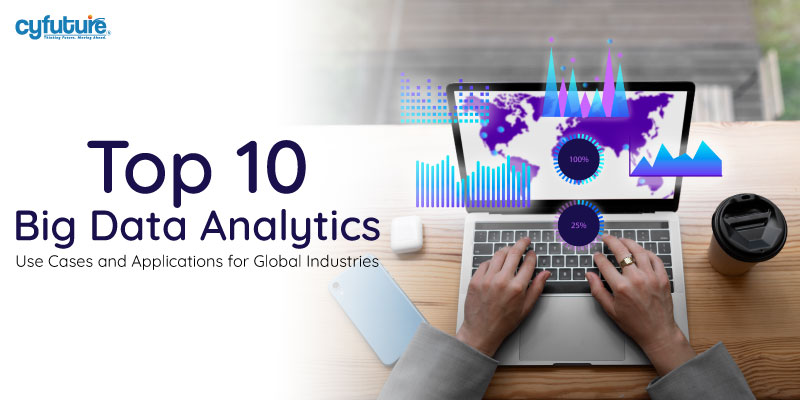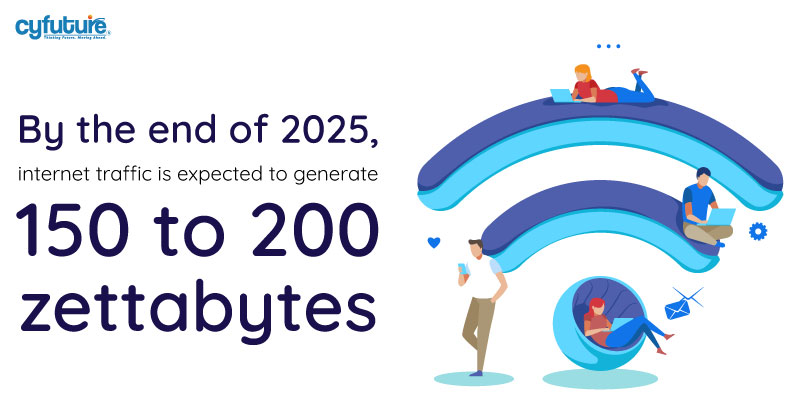Toggle navigation

Are you aware of how important data is for organizations and what impact it can have? Well, millions of organizations across the globe heavily rely on data. Data can be considered the currency of today’s digital landscape because, without data, it would be highly challenging for businesses to grow and nurture. It is present in multiple forms around us, right from your contact details to highly confidential government data. Data is such an important asset for businesses that they can invest millions of dollars to safeguard it against external threats and unexpected data loss. Thus, we can confidently claim that losing data for an organization could be catastrophic. But, now the question arises why is data so important and what exactly is big data?
Through this blog, we will uncover the complex world of big data including its use cases for various global industries. Additionally, we will explore how big data analytics might help these sectors. Big data is a major force behind the global digital revolution, thus it is critical to comprehend its nature and its applications. Furthermore, we must understand this complicated topic in simple terms. But before we get into the topic, we need to understand what is the scale of big data and what is its market presence.
As we have seen, our environment is filled with a vast amount of data. Moreover, the amount of data that already exists is being expanded daily by millions of zettabytes. So let’s dive into the specifics to comprehend big data and its application cases for international enterprises.
Big data refers to a large set of unstructured data that has not been analyzed and simplified yet. This data is generated at a very high volume and a very high pace. Furthermore, this data keeps getting larger if it is not processed on a timely basis. This data can be generated from various mediums such as:
Now that we have understood the basics of data and the various sources it can be generated from, let us dive into the basics of big data analytics.
As was previously shown, big data is just very large volumes of unstructured data that need to be processed and looked at. The act of arranging, assessing, and turning massive amounts of unstructured data into useful information is known as big data analytics. Big data analytics is essential to highlight the different patterns and findings that may be found from enormous amounts of data. These big data-derived insights may help businesses effectively design and implement a range of strategies and stay one step ahead of their rivals in this era of intense competition. Many different types of organizations might utilize this data to create marketing strategies or enhance operations.

Since multiple websites cater to the online selling of goods and services, data gathered from these websites is enormous. This data can contain crucial information such as consumer buying trends, price fluctuation, demand, and supply, advertising trends, returns and replacements, seller feedback, and much more data. Additionally, this data can contain various hidden patterns and insights that may not be visible to organizations beforehand.
With the help of big data analytics, e-commerce, and retail organizations can develop products that are high in demand. Additionally, they can release these products in the market at the peak season to gain maximum advantage. Furthermore, organizations can also take a step ahead by providing personalized and hyper-personalized services and customer experiences. They can enhance customer journeys and address crucial events, such as customer complaints, and customer churn.
Banks create new accounts daily and perform a billion transactions every single day. Thus for banks and other financial institutions, it is highly critical to monitor this data carefully. There is no denying that a significant amount of fraud and illegal activity occurs daily. Because of this, banks and other financial organizations must go through a large amount of data to identify any unusual or unlawful conduct that can jeopardize the financial system.
This helps the banks maintain a good and sound financial system in addition to protecting them against fraudulent activity. Furthermore, banks can create and execute an all-encompassing risk management plan that might protect them against unanticipated hazards. Furthermore, banks can introduce more investment products, revamp their existing products, or discontinue products that are not producing high yields.
The world has witnessed a sudden spike in tourism post-Covid. Due to this, the travel & tourism industry has been on a continuous boom. After airplanes, buses, taxis, trains, as well as highways and seaways, are the most widely used modes of transportation. These sources can produce a large amount of data that can disclose the most popular tourist locations, statistics about peak travel times, and the number of visitors. Many travel and tourism companies may utilize this vast amount of data to improve and optimize their vacation packages to market trends.
Moreover, many airlines and private railroad carriers can also optimize their fare and implement more effective pricing schemes. Additionally, hotels all across the globe can use predictive analytics to anticipate seasonal demand and better prepare for sudden surges or drops in tourism. This can not only benefit the travel and tourism industry but also tourists all across the globe.
You must have heard a lot about block boxes that an investigation team tries to access post every incident. A “black box” is simply a device that records critical flight data. This can be the flight’s direction, speed, altitude, climb and descend rate, flight plan, and aircraft configuration. It can also record the crew’s various actions throughout the flight. A CVR (Cockpit Voice Recorder) additionally records all of the crew’s and air traffic controller’s conversations. Since thousands of flights operate throughout the globe daily, the data recorded by block box is huge.
Airlines can analyze this data and observe patterns to analyze the performance of various aircraft systems and components. Additionally, they can use data from accidents to formulate more stringent safety measures and enforce checklists that will minimize the risk of accidents. Hence, this will not only make air travel safe but will also ensure the optimal functioning of the aircraft.
Global automakers are competing with each other to create new vehicles that not only have the newest features but also outperform their competitors. The automobile industry, which combines several distinct industries, has many uses for big data analytics, whether it be for marketing strategy or research and development. The automotive industry, a vital component of the public and private ecosystems it supports, produces enormous amounts of data daily.
One can use this data to track and monitor an automobile’s performance, examine vehicle needs, or figure out why customers are complaining. Furthermore, this data can predict market trends for automotive businesses’ manufacture, sales, and technology.
The healthcare sector is an immense industry that generates enormous amounts of data that are vital for research, insurance companies, medical facilities, governments, and individuals. This data can comprise patient records, medical history, insurance records, and so on. Furthermore, it can highlight various trends that showcase the spread of a virus or illness.
Big data analytics, when used properly, may analyze massive data blocks and enable medical researchers to get medical supplies from around the globe in addition to creating more successful and focused treatment programs. Additionally, one can use this data to predict pandemic or epidemic outbreaks to contain their ferocity.
Law enforcement agencies and government organizations rely heavily on data as it is one of the most crucial assets for them. Multiple sources, such as body cameras, CCTV footage, satellites, public schemes, registrations, certifications, and social media, can generate this data. Furthermore, government agencies can also buy data from private organizations which can ultimately result in a huge database.
Big data analytics in this case can be used to predict consumer frauds, political shifts, and tracking border security. Additionally, governments across the globe can track and monitor the performance of various welfare schemes and programs. With the help of big data analytics, various security and intelligence agencies can track terror or criminal activities, enhance surveillance, and predict security threats in real time. This can be highly beneficial in stopping crimes and preventing security infringement.
We are all very well aware that overutilization will exhaust the most precious resources, oil and gas. Big data analytics has several applications in the energy sector. These can range from providing fresh approaches to innovation to employing data sensors for tracking and monitoring novel resources.
Additionally, big data analytics can highly benefit the energy industry in several ways. Various refineries and energy organizations can track and monitor the performance of various energy equipment and pipelines. Furthermore, they can effectively manage predictive equipment maintenance in remote and deep-water locations. A few of the useful data that the technology may provide in the field of renewable energy include deforestation maps, cost-benefit analyses of different energy production methods, and geographical data insights for the construction of renewable energy facilities.
Across the world, farmers utilize a variety of agricultural techniques to produce an extensive array of commodities. These can include unprocessed food products, such as fruits, vegetables, spices, and other valuable crops. One of the key factors influencing agriculture is the weather. Other crucial elements in agriculture include crop rotation and soil fertility.
Geospatial data insights for the development of renewable energy facilities, cost-benefit evaluations of various energy production techniques, and deforestation maps are just a few of the valuable data that the technology may offer in the field of renewable energy. The agricultural industry can leverage the power of big data analytics and can provide a large amount of agricultural production.
Read More: Big Data Analytics Service: Uncovering Secrets Towards Success
Every business aims to achieve higher growth and set new benchmarks constantly. The most common challenge faced by new businesses is a lack of insights and data. Businesses that don’t have the resources to analyze complex data and get actionable results most often lose the competitive race.
With its vast capabilities set, big data analytics may therefore be a business process management and streamlining virtuoso. Businesses can do much more with the data insights including making more focused, data-driven, and intelligent choices.
To sum up, big data is the foundation of the current digital era and has an impact on a variety of businesses worldwide from various industries. Its wide range of uses, from government and agriculture to retail and healthcare, demonstrate its revolutionary power. Big data analytics helps businesses make wise decisions, optimize operations, and obtain insightful knowledge. Using these technologies is essential as the amount of data generated worldwide increases. The big data market’s exponential expansion highlights its importance. On the whole, global businesses are continuing to innovate and successfully negotiate the challenges of today’s complicated business environment.
FAQs
Q1 How can organizations handle the scalability requirements of Big Data Analytics?
Answer: By using cloud-based solutions that provide elastic computing resources, organizations may manage the scalability needs in Big Data Analytics. This guarantees optimal performance by enabling them to scale up or down in response to processing needs.
Q2 How can organizations ensure compliance with data protection regulations in Big Data Analytics?
Answer: Ensuring compliance involves enforcing measures like anonymizing sensitive data, obtaining necessary consent, and frequently evaluating data procedures. Organizations must inform themselves about any modifications to data protection regulations to ensure compliance with legal requirements.
Q3 How does Big Data Analytics contribute to personalized marketing?
Answer: Big Data analytics analyzes consumer preferences, actions, and demographics to allow targeted marketing. Using this data to inform more focused and pertinent marketing activities increases consumer engagement and conversion rates.